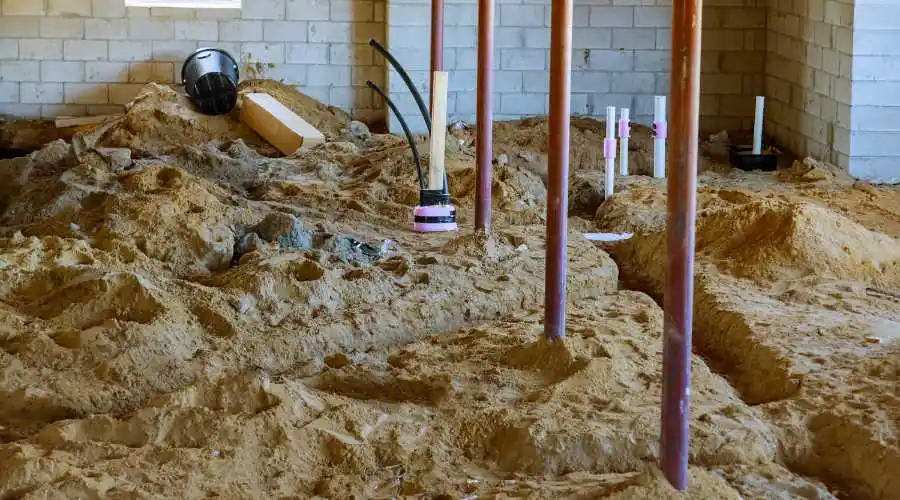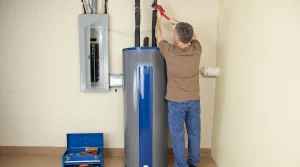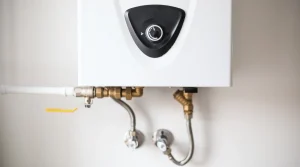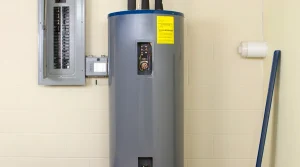If you live in Clifton, NJ and your home is pushing the 40-year mark, it might be time to think about repiping. Many homes built in the 70s and early 80s used outdated plumbing materials like galvanized steel or iron. Even if your home was lucky enough to have copper pipes, age can still catch up with them. So, what’s the real price tag for repiping a house in Clifton, NJ?
Let’s find out!
Factors That Influence the Cost of Repiping
The cost to repipe a house isn’t one-size-fits-all. Several factors come into play:
- Size of Your Home: Bigger homes with more pipes to replace will naturally cost more. Some might express this as the “cost per square foot.”
- Choice of Piping Material: The type of pipe you choose can significantly impact the cost. While plastics like PEX may be cheaper upfront than copper, consider their lifespan too.
- Replacement Method: How you replace the pipes matters. Traditional methods involving trench digging are costly. Trenchless technologies can be more efficient and cost-effective.
- Extent of Replacement: Some plumbing companies may opt to replace only visible pipes to cut costs. However, if your home has lead pipes, they need immediate replacement for safety reasons.
Pro Tip: It’s often best to replace the entire plumbing system at once to prevent future problems and potential home damage.
Types of Piping Materials
Three common materials are used for repiping homes: copper, PEX (cross-linked polyethylene), and CPVC (Chlorinated Polyvinylchloride).
Copper Pipe
Pros:
- Durable and long-lasting.
- Suitable for indoor and outdoor use.
- Easy to measure due to rigidity.
Cons:
- Expensive.
- Prone to bursting in freezing temperatures (though most of the times, this isn’t a big concern).
PEX Pipe
Pros:
- Flexible and durable for indoor applications.
- More affordable than copper.
- Quick and easy to install.
Cons:
- Not suitable for outdoor use or UV exposure.
- Sensitive to constriction or expansion.
- Prone to damage from rodents.
CPVC Pipe
Pros:
- Cost-effective.
- Easy installation.
- Highly resistant to corrosion.
Cons:
- Inconsistent manufacturing quality.
- Susceptible to bursting.
Cost Breakdown for Repiping
- Copper Pipe: The most expensive option, with material costs generally ranging from $2 to $4 per foot. Installation can push the price to five figures for larger projects.
- PEX Pipe: More affordable, generally ranging from $0.50 to $2 per foot. Comprehensive jobs may cost up to $15,000.
- CPVC Pipe: The least expensive option, generally at around $1 per foot. Replacement for an average-sized home is typically a few thousand dollars.
The average cost of repiping a house varies widely, from a few thousand dollars to tens of thousands. Your choice of materials, the size of your home, and the extent of the replacement all play a role. Additionally, you can consider relining existing pipes using trenchless technology to extend their lifespan and reduce costs.
Why Repiping Matters
But why should you care about repiping? Neglecting aging or faulty pipes can lead to water damage, costly repairs, and even health risks if lead pipes are involved. A well-executed repiping job ensures a safe, efficient, and trouble-free plumbing system for your home.
- Preventing Water Damage: Pipes deteriorate over time, and when they do, leaks are often the result. Even minor leaks can cause extensive water damage to your walls, ceilings, and floors. This not only ruins your home’s aesthetics but also weakens its structural integrity. Repiping eliminates the risk of hidden leaks, safeguarding your home from water damage.
- Avoiding Costly Repairs: Regular maintenance and timely repiping can save you a fortune in plumbing repairs. Fixing isolated leaks or burst pipes can be expensive, and the costs add up if these issues recur. Repiping might seem like a significant investment initially, but it’s a long-term cost-saving measure.
- Health Concerns with Lead Pipes: If your home was constructed before the 1980s, it might contain lead pipes. Lead is a toxic substance that can leach into your drinking water, posing severe health risks, especially to children and pregnant women. Repiping with modern, lead-free materials ensures your water is safe to use and consume.
- Enhancing Efficiency: Old pipes can accumulate mineral deposits and sediment, reducing water pressure and flow. This can lead to frustratingly slow showers, inefficient appliance operation, and longer wait times for hot water. Repiping rejuvenates your plumbing system, improving its overall efficiency and your daily convenience.
- Peace of Mind: Perhaps one of the most significant benefits of repiping is the peace of mind it brings. Knowing that your plumbing system is in excellent condition, free from hidden leaks and the risks of lead contamination, allows you to relax and enjoy your home without constant plumbing worries.
So, whether you choose copper, PEX, or CPVC, and regardless of the cost, investing in repiping is an investment in your home’s future. Don’t wait until a plumbing disaster strikes. Reach out to professionals like the BJC Clifton Plumbers team today to learn more and safeguard your home’s plumbing. Your wallet and peace of mind will thank you.




